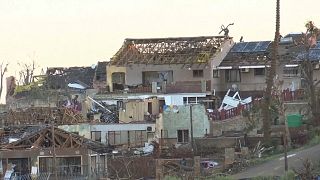Extreme weather
Tropical storm Remal flooded dozens of coastal villages and left nearly 30 million people without power Monday in southern Bangladesh and eastern India. At least 10 people died in Bangladesh.
About 3.7 million people along the coast were affected, said Bangladesh’s junior minister for disaster management and relief, Mohibbur Rahman. More than 35,000 homes were destroyed and nearly 115,000 were damaged. Nearly 800,000 people were evacuated from vulnerable areas on Sunday.
Bangladesh, a delta nation of nearly 170 million people, has a history of violent storms. Disaster preparedness programs have upgraded the capacity to tackle natural disasters, resulting in fewer casualties. Changing climate patterns have increased storms’ intensity, making preparations more urgent.
Remal weakened after making landfall in Bangladesh’s Patuakhali district early Monday, with sustained winds of 111 kilometers (69 miles) per hour. India’s Meteorological Department said it was likely to weaken throughout the day, but warned of heavy showers over Assam and other northeastern states for the next two days.
India’s Kolkata airport reopened after being shut Sunday. Bangladesh shut the airport in the country’s second largest city, Chattogram, and canceled all domestic flights to and from the coastal district of Cox’s Bazar. Loading and unloading at Chittagong seaport was halted.
Pakistan heatwave
Temperatures soared to over 50 degrees Celsius (122 degrees Fahrenheit) in parts of Pakistan , as an ongoing heat wave gripped more areas, including the southern district of Sukkur.
The heat wave is forecast to continue for at least a few more days.
Doctors are treating victims of heatstroke at hospitals across Pakistan.
Heatstroke relief camps manned by volunteers have been set up to provide iced water for people in Sukkur, with residents saying the government has done nothing to help them.
People have also taken to the waters of the popular Indus River to save themselves from the extreme heat.
Javed Ahmed said he and his friends came to the river every day, as electricity supply cuts meant they couldn't keep cool in their homes.
Authorities have urged people to stay indoors, hydrate and avoid unnecessary travel.
But labourers say they need to work to feed their families.
Bopal Khan worked under the hot sun on a road construction site, stating he had no choice but to continue his job in the heat.
Pakistan's Meteorological department says the country could experience more episodes of extremely high temperatures ahead of the pre-monsoon rains.
Officials said the current heat wave was being experienced due to climate change and is the latest climate-related disaster to hit the country in recent years.
Melting glaciers and growing monsoons have caused devastating floods, at one point submerging a third of the country.
In a statement the Met department said thunderstorms and isolated rain are predicted in upper parts of the country from 28th May to 1st June, so severe heatwave conditions are likely to subside.











01:06
Turkey swelters under soaring heatwave as temperatures expected to go higher
01:22
World will have to learn to live with heatwaves, UN says
00:56
South Africa: At least 101 dead in Eastern Cape floods as rescue efforts continue
01:29
Experts warn of danger of exercising in extreme heat and humidity
01:46
Algerian football players deal with intense heat as season ends
01:06
South Africa declares state of disaster following severe weather